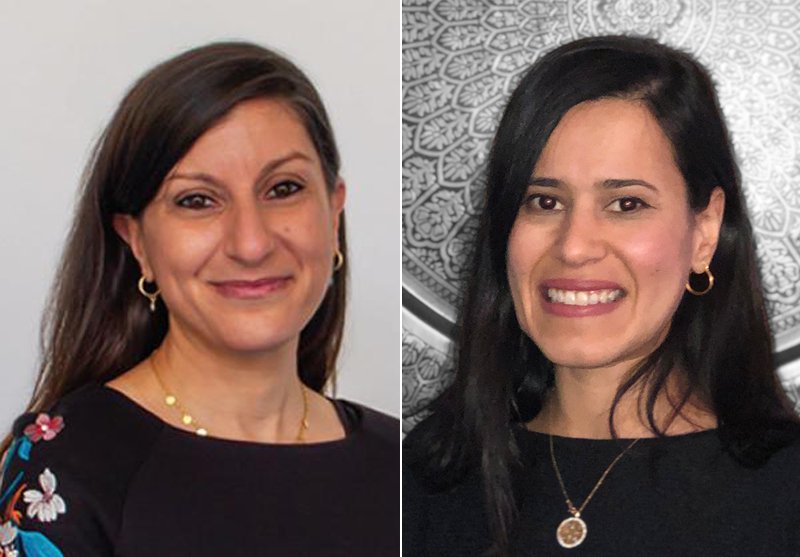Mellon Foundation Recognizes Syracuse Black/Arab Racial Justice Research Project
Professors Carol Fadda and Dana Olwan will examine the impact of racism and discrimination on the interconnected histories and lived experiences of Arab and Black communities living in the city of Syracuse.

Two faculty members of The College of Arts and Sciences are the recipients of an Andrew W. Mellon Foundation grant for research on race and racialization, social justice and community engagement.
Associate Professors Carol Fadda and Dana Olwan’s project “Black-Arab Relationalities: Confronting Racism, Narrating Solidarities” will examine the impact of racism and discrimination on the interconnected histories and lived experiences of Arab and Black communities living in the city of Syracuse. The project is supported by a $500,000 award from the Mellon Foundation’s Higher Learning initiative. Fadda and Olwan will use the information gathered in Syracuse to study racial politics in the United States.
Fadda is an associate professor of English who holds faculty affiliations with the Department of Women’s and Gender Studies and the Middle Eastern Studies program. Olwan is an associate professor in the Department of Women’s and Gender Studies and is affiliated with the Middle Eastern Studies and the Native American and Indigenous Studies programs.
Syracuse ‘Microcosm’
According to Fadda and Olwan, the project’s focus emerges directly from the racial and socioeconomic conditions shaping the politics, histories and realities of the city of Syracuse and Syracuse University. Located on the traditional territories of the Onondaga Nation, the city of Syracuse is home to one of the oldest Black communities in the U.S. that dates to the early 19th century. In the past two decades, and against the backdrop of urban racism, declining employment opportunities and increased poverty for racialized communities, Syracuse has served as a point of arrival and settlement for immigrant and refugee communities from various countries, including Syria, Iraq, Sudan and Somalia. As such, Syracuse “is a microcosm of national racial structures and hierarchies that are constituted through the geographic separation of communities in relation to their racial, ethnic, and national origins,” Fadda and Olwan say. Expressing their investment in this initiative, they state: “As non-Black Arab feminist and humanities scholars, we focus on Black and Arab relationalities within the city of Syracuse, where we both live and work, to develop ethical, non-hierarchical and accountable solidarity politics integral to anti-racist work.”
Three Focal Points
Fadda and Olwan will focus their work over the three-year initiative in a trio of arenas: community-building and support; pedagogical transformation; and living partnerships and collaborations. The activities through which they plan to accomplish those goals include:
- Engaging the intersecting histories and realities of Arab and Black communities in Syracuse
- Developing collaborative spaces that highlight the relations between Black and Arab local communities as informed by the city’s racial histories, current realities and future trajectories
- Supporting solidarity among those communities through pedagogical, scholarly and community-based interventions
- Creating multiple constituencies of partnerships and sustainable community relations within the University, the city of Syracuse and beyond
- Inviting local Black and Arab communities to share their histories and stories for a living archive of materials that capture the rich, interconnected and shifting relations among these communities
- Rethinking modes used to generate knowledge at institutions of higher learning through collaborations with community partners
Local, National Value
University Vice President for Research Duncan Brown says the Mellon Foundation’s recognition of Fadda and Olwan’s work demonstrates the importance of humanities research and the impact of their scholarship in improving people’s lives. “The community-based, locally invested work that Professors Fadda and Olwan are undertaking will engage the University’s neighbors in discussing pressing issues in American racial politics and policy. The knowledge the project will produce will help communities across the United States improve racial and multi-cultural understanding,” Brown says.
College of Arts and Sciences Interim Dean Lois Agnew says, “On behalf of the College, I congratulate Professors Fadda and Olwan for this prestigious award, which will support their efforts in taking on the very real issues of racism and discrimination facing Arab and Black communities right here in our city. The humanities give us the critical tools needed to both understand other peoples’ experiences and to forge the ethical and effective solutions that can change long-standing challenges. I look forward to seeing the fruits of this project, locally and beyond.”
The Mellon Foundation awarded its inaugural round of Higher Learning program grants to 11 other projects in the category of race and racialization. Eight other grants were presented for projects focused on social justice, and six more were given for initiatives on civic engagement and voting rights.
The program supports inquiry into “issues of vital social, cultural and historical importance…to help illuminate the significance of voting rights controversies in U.S. history from numerous humanities perspectives; demonstrate the complex import of race and racialization within U.S. culture and society and highlight the role of the literary imagination in making and remaking worlds and societies, past and present.” Higher Learning Director Philip Brian Harper says its focus is “to highlight the essential role of the humanities—including those disciplines concerned with the interpretation of expressive culture—in addressing our society’s most salient social issues, past and present. We seek to support not only incisive analytical work but also projects that creatively envision more just and equitable futures.”
This article originally appeared on SU News. It was published by Diane Stirling.
Featured
Carol Fadda Associate Professor
Dana Olwan Associate Professor
Media Contact
Diane Stirling
